It is not unusual for new motorcycle owners to fly to California, then ride their new CSC Motorcycle back home. But – typically – the cycles purchased are the RX3 Adventure or the new RX4. So it was interesting when CSC received two orders for the smallest motorcycle models from Russ and James.
Their plan was to buy a TT250 and SG250 from CSC in California, then ride them about 3000 miles home to Marysville, OH (James) and Pittsburgh, PA (Russ).
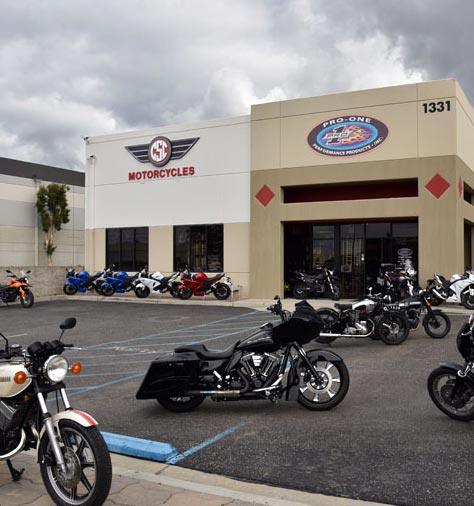
CSC Motorcycles – Azusa, CA
Russ and James started planning this trip in 2018. Russ already owned a BMW F800GSA and chose to buy a CSC SG250 “café racer” since it was something totally different. His partner, James who owns a Honda CB1000R and KLX, opted for the CSC TT250 Enduro. Both bikes share the same air-cooled, 229cc motor. The SG250 is outfitted with 17-inch wheels with street tires. The TT250 has an 18-inch rear and 21-inch front wheel with 80/20 dual sport tires. James also had the CSC Motorcycles shop install a smaller rear sprocket for better highway speed.
Their goal was to ride conservatively, trying to average 300 miles a day. This would work out to 17 days for a “fly and ride” to Los Angeles and back to Pennsylvania, riding the back roads across the U.S. The planned route included:
START – CSC Motorcycles in Azusa, CA
Death Valley, CA (in June!)
Rachel, NV
Bonneville Salt Flats, UT
Strawberry Reservoir, UT
Moab, UT
Durango, CO
Colorado Springs, CO
The Ranch, NE
Omaha, NE
Geode State Park, IA
Dillsburg, IL
Marysville, OH – home for James
Pittsburgh, PA – home for Russ
The fun started on June 27, 2020 at 7 AM. Wade and Sara from CSC helped James and Russ with the paperwork for their new bikes, and then getting them loaded for the ride.
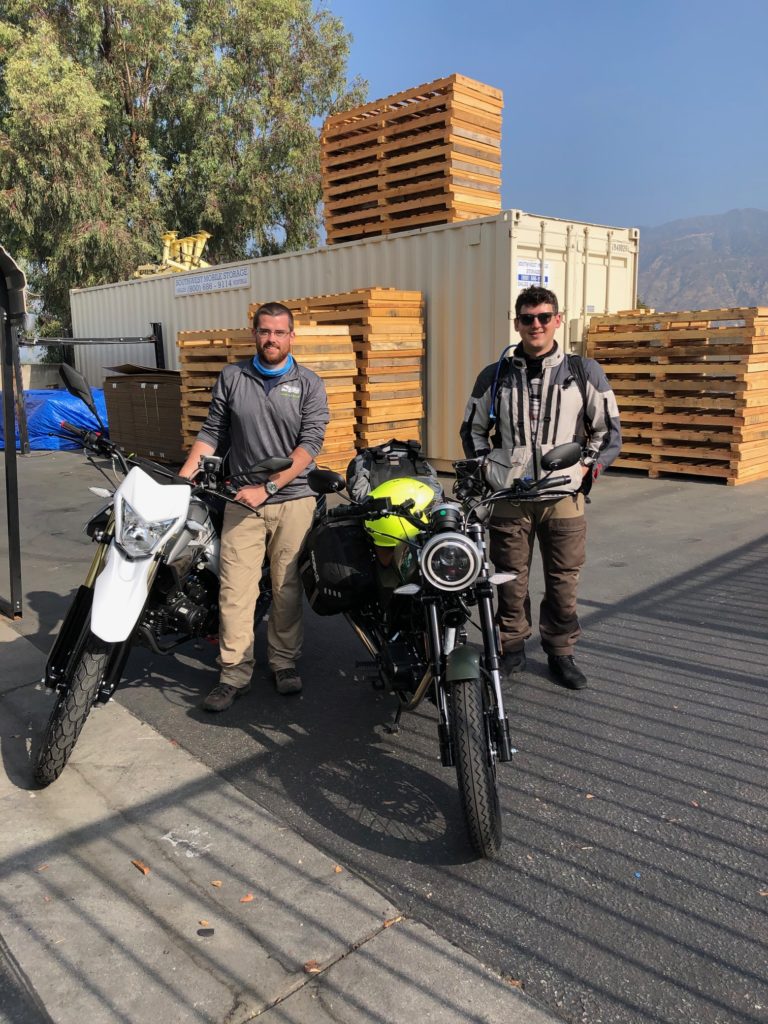
James and Russ – Ready for the Epic Ride
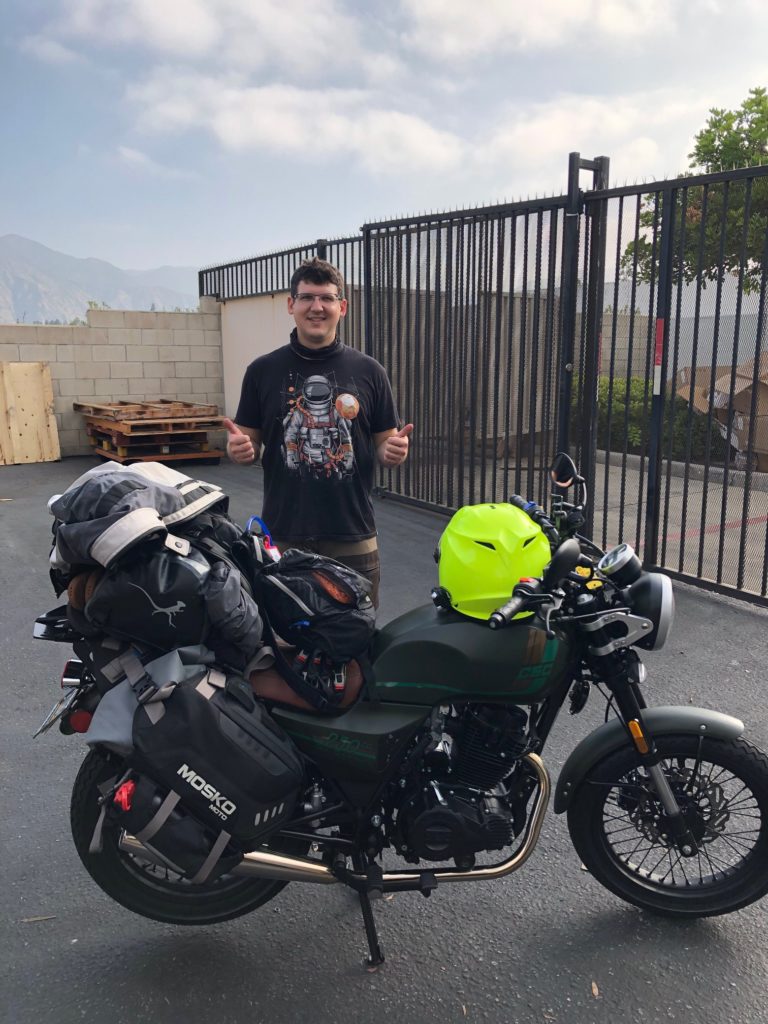
Russ with his loaded CSC SG250
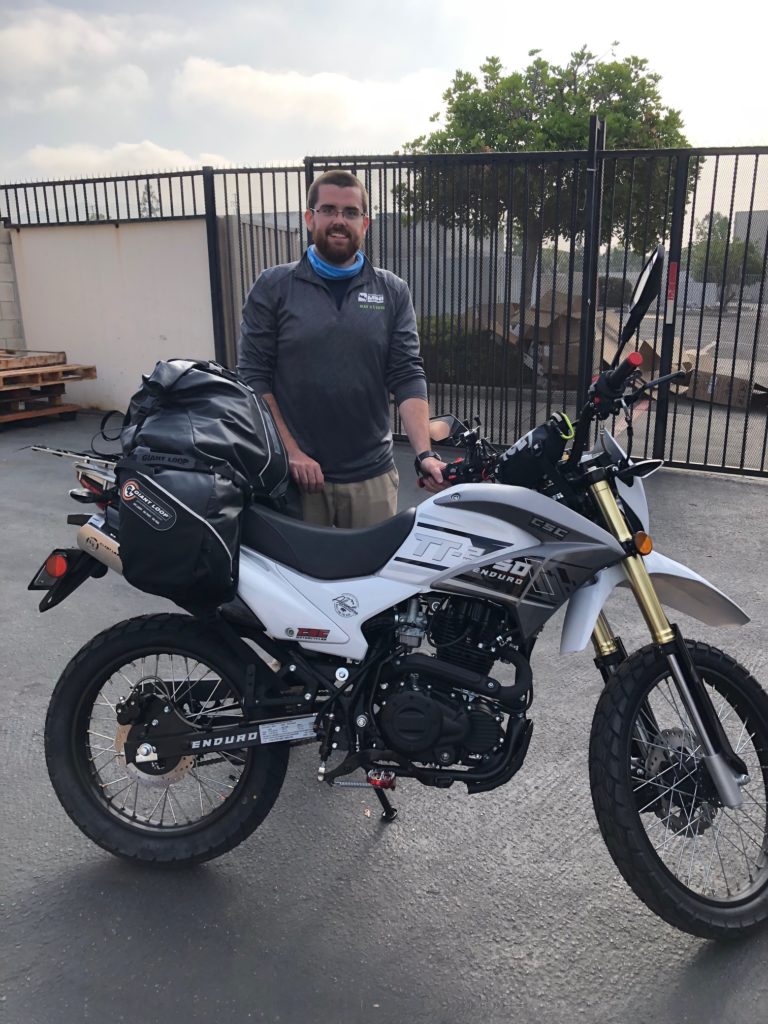
James ready to ride his CSC TT250
The intrepid duo hit the road and spent the better part of the day just navigating Los Angeles traffic. Later, Russ commented (see his full Ride Report on the ADVrider forum): “On tonight’s list of activities is to try to add some preload to the rear shocks (of the SG250) because it was a very bouncy ride today. The stock setting is a little on the soft side for an extra 270 pounds (of rider and gear.) It rides pretty comfy though without the extra 50# of gear on it.”
The next day continued with a ride through Long Beach and Santa Clarita. Russ had his first problem.
“We were mildly inconvenienced by a loose connector under my gas tank on the way to Long Beach. We had to pull it all apart to wiggle the main connector and life was restored. These bikes are very easy to work on.”
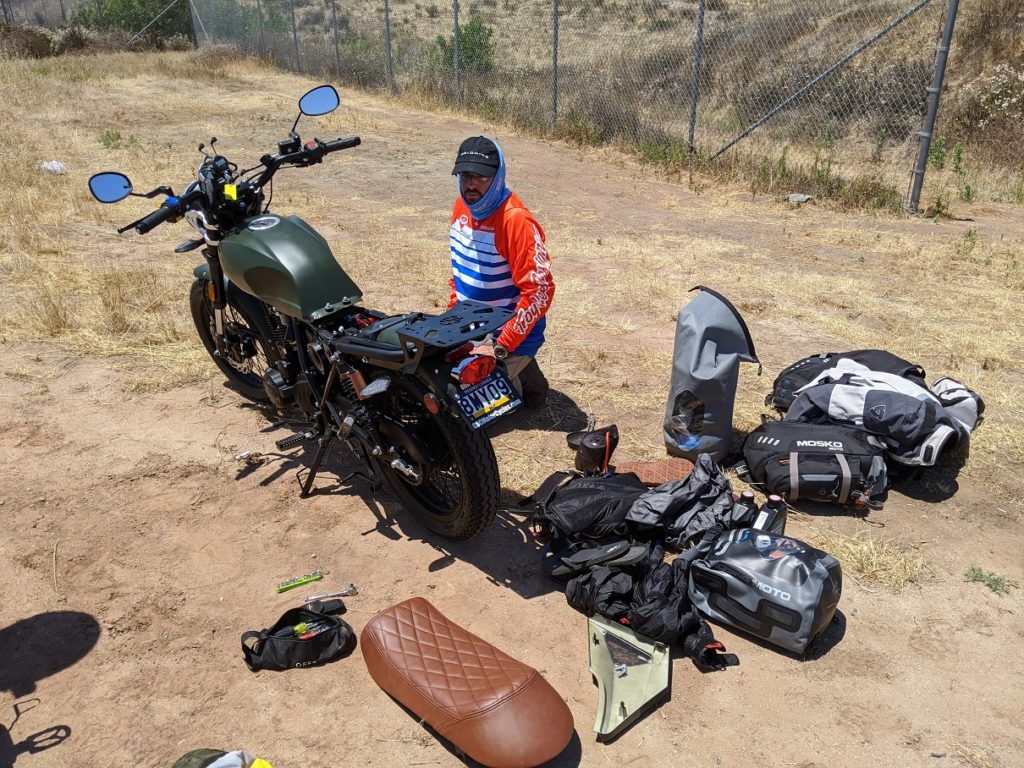
Day One – Fixing a loose electrical connector
Then it was on towards Rachel, NV. From the Ride Report, Russ commented: “After we left the hotel Sunday morning we headed out towards Mahogany Flats and the Angeles Forest. From there we made our way to Kern County, somewhere outside of Mojave, and found a giant wind farm. This was the first attempt at taking the SG off pavement and it did surprisingly well! But the pegs are way too small for standing. The TT just chugged along and hasn’t had any problems so far.”

Panorama into Searles Valley

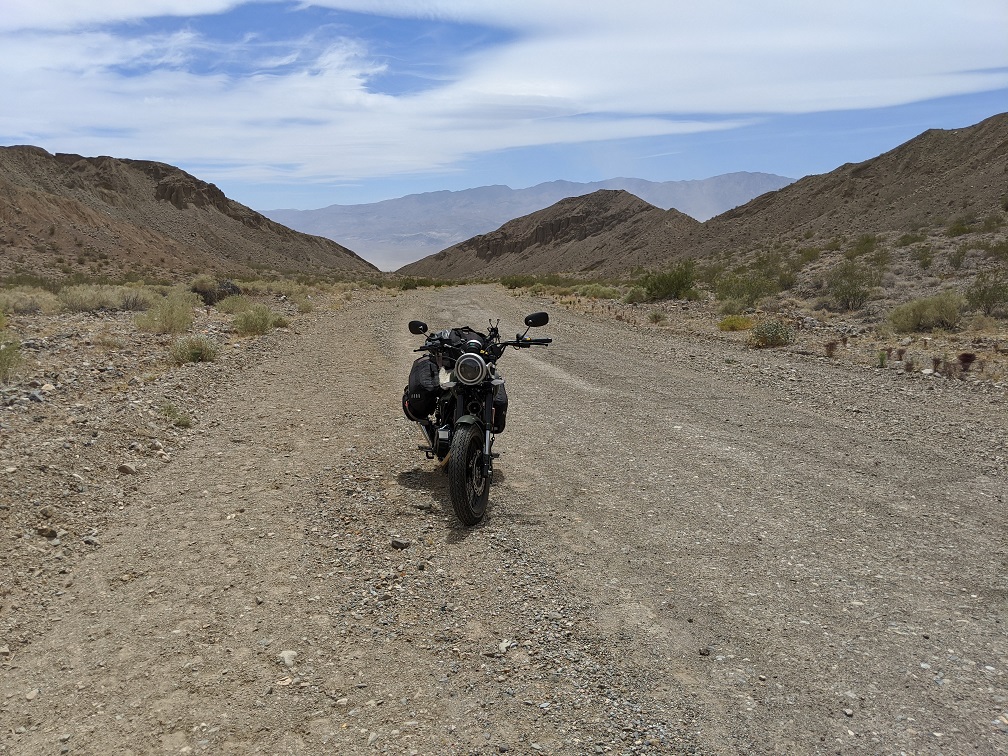
Mahogany Flats, Death Valley, CA

“The next stop was Jawbone gas station before heading into the hottest temperatures we’ve seen yet. But there were some really cool passes we had to go through before heading up to the Flats.”
“Monday started off with a very brisk ride back to pavement and Stovepipe Wells. We gassed up, used the bathrooms, and left for Tonopah. The ride was all up hill, with a head wind, in the 50F. The speed limit to Tonopah was all 70mph and the bikes were not having it. We were able to hold about 50 mph for most of it, but about 20 miles outside of Tonopah they were getting hot and acting up. It was early noon by the time we got there.”
“The goal for Tonopah was to get gas, find some food, get some coffee. I discovered the SG will flash the fuel gauge and has a low fuel light. We also needed to dig out a tool to get into the crank cover to do the initial, break-in valve adjustment. Wade told us when we adjusted the valves the bikes would run a bit better. That is an understatement.”
“Our max yesterday was 68 mph, not GPS confirmed. After adjusting the valves, I hit 78 mph – again, not GPS confirmed. And the bikes are so much happier at higher revs for longer periods! The bikes post break-in service are wonderful.”
“The trip to Rachel was about 110 miles and full of beautiful mountains and valleys and cows. This part of Nevada is truly a thing to behold.”
“We gassed up in Ely, NV. We’re now looking for some warmer blankets because we don’t want to spend another freezing night in the desert. Next stop, Bonneville Salt flats.”
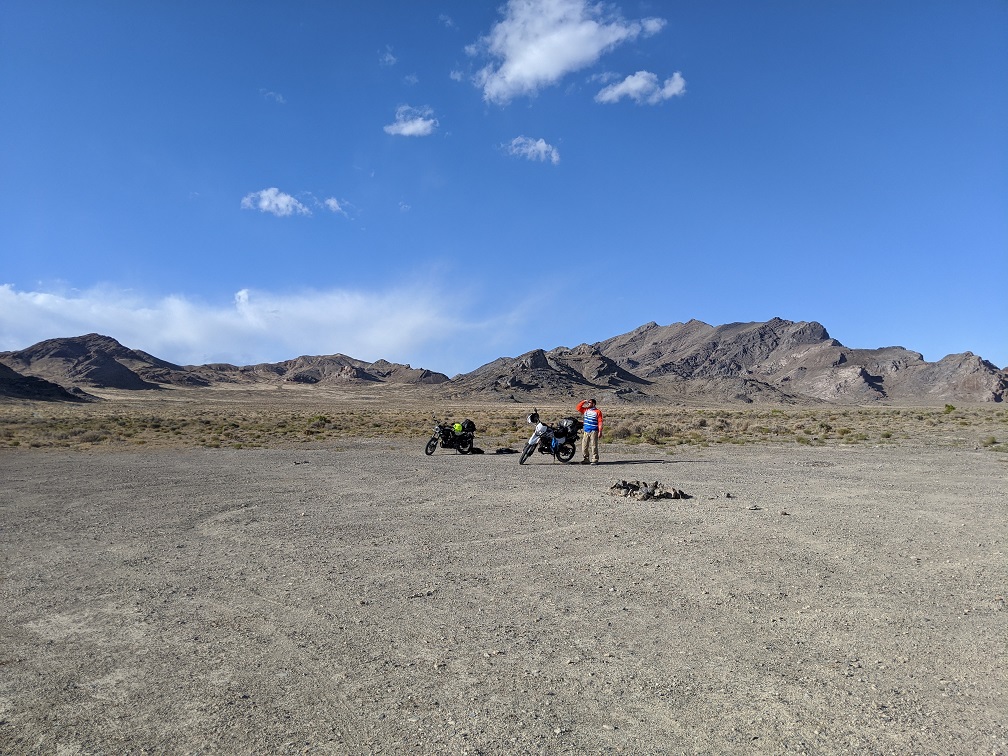
Lost Boys Campsite, Bonneville, UT
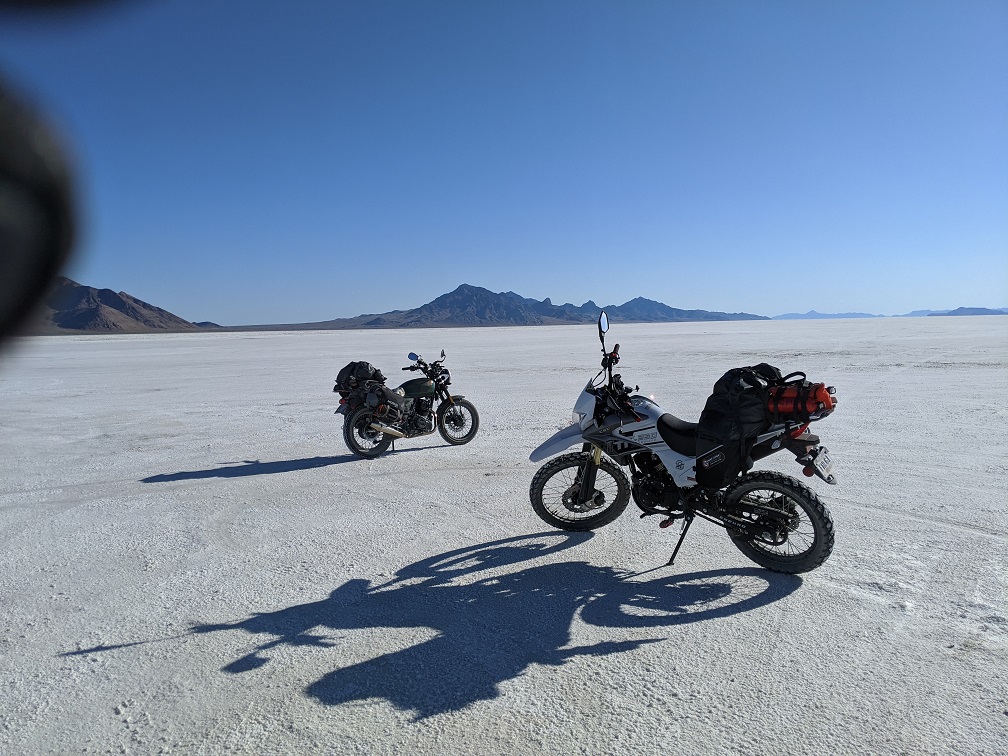
Fun on the Bonneville Salt Flats!
“At Bonneville we went out on the salt for some fun and pictures. Interstate 80 is the road east from Bonneville and since our bikes can’t go that fast, we took the Frontage road. It was 60 miles of the worst “paved” roads I’ve ever seen. Mud, dirt, gravel, and sand and just incredible amounts of fun. We finally saw some antelope, too!”
“From Grantsville we headed over to a Walmart in Tooele to find some long underwear since nights in the mountains are cold and with the increased elevation, days would likely get colder, too. After we left Steadman’s, it was a straight shot to Price where we found some more BLM land and camped for the night.”
“We’re currently 40ish miles outside of Moab and had the first hiccup of the trip. My engine shut off while running up a big hill. We’re thinking (hoping) it was only dust passing through the carb or just a little overheating. The SG250 cranked right over and still runs and idles fine. We’re planning to do an oil change tonight at around 1400 miles, so hopefully that will help. We did our break-in oil change around 300 miles, so we’re at about 1100 miles for this change. I am not opposed to more frequent oil changes because we are running pretty high revs for a long amount of time.”
“I just changed the oil and it sounds so much better. The valves are still loud, but it pulls strong, so I’m calling it good.”
“We planned so that we would get to Moab early enough to see Arches National Park, so the ride from last night’s camp spot on Mud Springs Plateau, outside of Price was a quick one. We took 191 South to about Green River and were then able to get off the fast road. It turns out that all the side roads are unkept and therefore a lot of fun.”
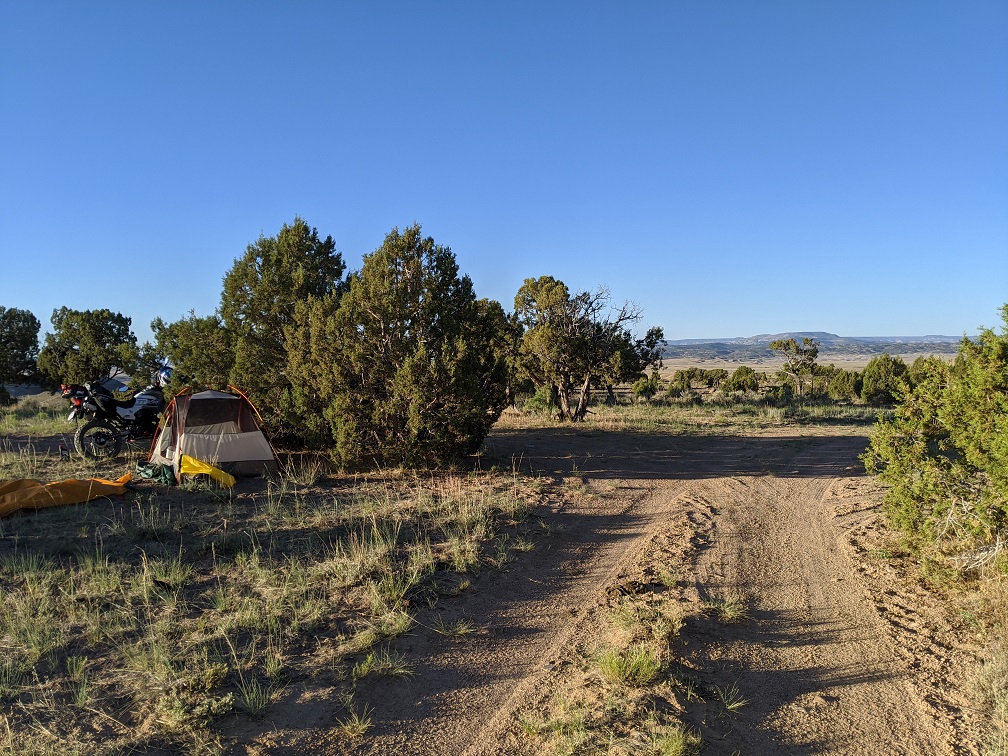
Mud Springs Plateau, headed for Moab, UT
“The trip from Moab to Ironton, CO was fairly uneventful, besides tipping my bike over while putting on rain gear – for a storm we completely missed. The road out of Durango, CO is amazing. If you’ve never been on it, car or bike, add it to the list. It’s called the Million Dollar Highway for a reason. Due to the altitude and slope of the road, we spent a lot of time in third gear, but the bikes motored on and we made it. We stopped at a pass before Silverton for a bathroom break and to let the bikes cool a little.”
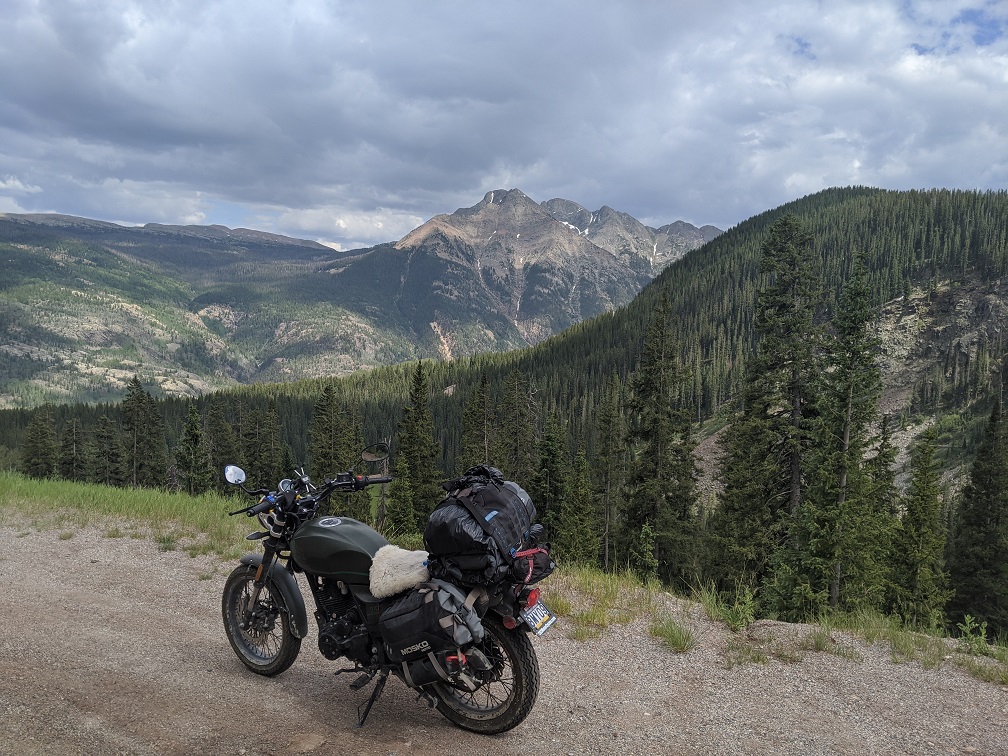
The “Million Dollar Highway”
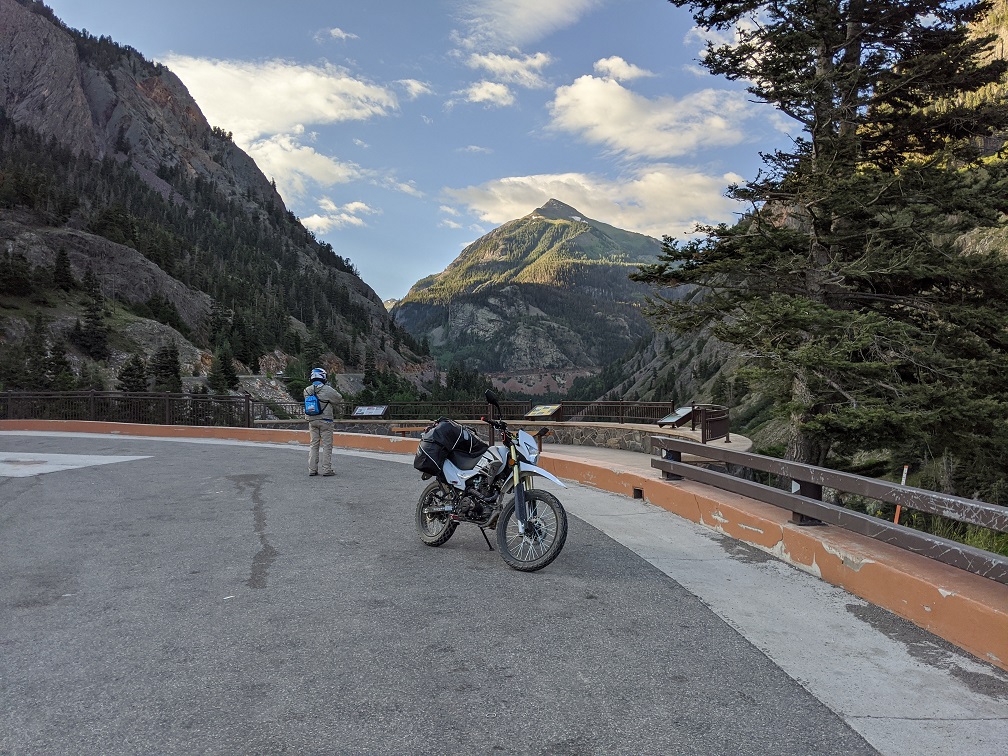
James on the Million Dollar Highway – photo opp
“The road down to Silverton was full of switchbacks, stunning scenery, and hundred-feet drops with no guard rails. That’s a lot to take in at once. Silverton used to be a silver mining town, and it still only has one paved road. We got a little lost on the dirt side roads trying to get back to the main road.”
“The road between Silverton an Ouray is the highlight from yesterday and today. It’s all award-winning photography if you have the skill – which I don’t! Ironton is a free for all camping area and there were a couple dozen motorhomes and trailers there for the holiday. We found a nice spot for the night, made dinner, and turned in. I actually got to read a little too.”
“The weather started off great yesterday but ended up in cold rain then a hotel for the night. There weren’t a lot of pictures from yesterday since we couldn’t see a lot anyway.”
“From Ironton all the way to Gunnison it was blue skies and crisp air. We stopped for lunch and gas and noticed a pretty big rain cloud following us, so we got the rain great out and continued on.”
“We managed to make Monarch Pass with no real issues besides cold. It was over 11,000 feet elevation! We got to within about 70 miles of Woodland Park, in the plains before the mountains, and I had to stop to get all my warm gear on. James said it was in the 50’s.”
“When we got to Woodland Park, James suggested we just get a hotel for the night so we could warm up, then leave early for Pikes Peak the next morning. That was the best solution. So now we’re in Manitou Springs and mostly dry and ready for a big mountain and close to 400 miles of riding to The Ranch in Nebraska. It’s going to be a long day, but it should be the last one of the trip.”
“Yesterday, James and I did make it to the summit of Pikes Peak, but the bikes did not. It turns out the summit road is under construction, so they make everyone park in a lot at mile marker 16 and shuttle up. The bikes were starting to breath heavy, but they were still chugging along. The switchbacks above the tree line were a ton of fun because you didn’t want to roll off the throttle. Which resulted in scraped pegs on every turn. I am a firm believer of trying to hit pegs as often as possible. It’s good for the soul, or something.”
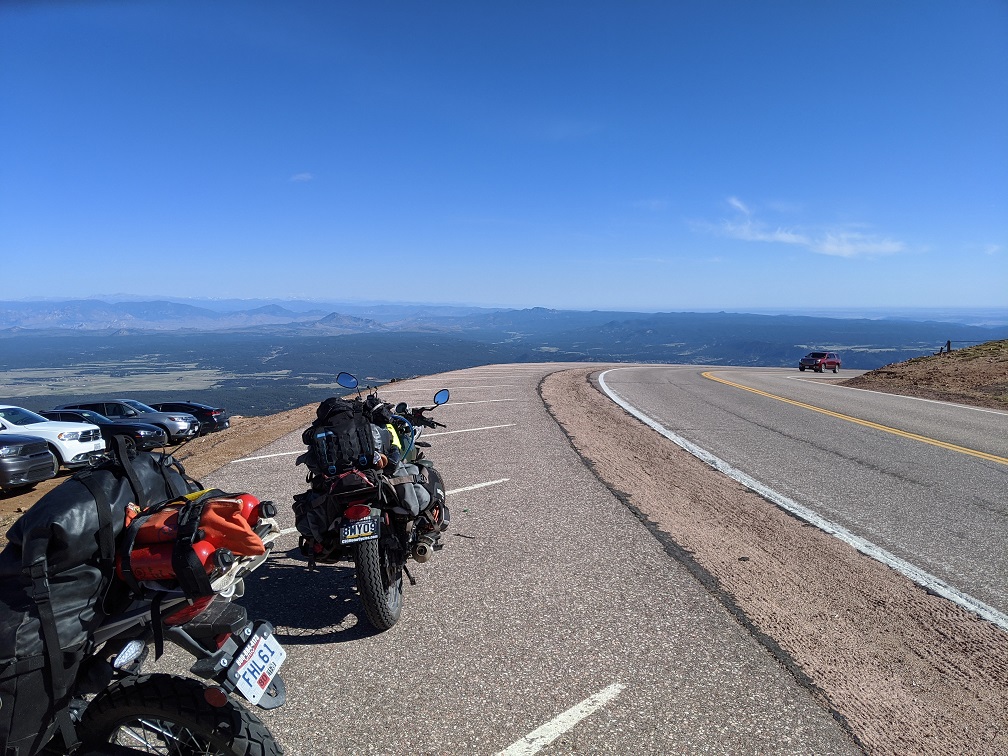
Parking the bikes at Mile 16 on Pikes Peak
“There was a stop a few miles up to make sure you had a park pass and I had trouble getting started because my chain was so loose the bike kept stalling. Which meant we got to adjust our chains on top of Pikes Peak.”
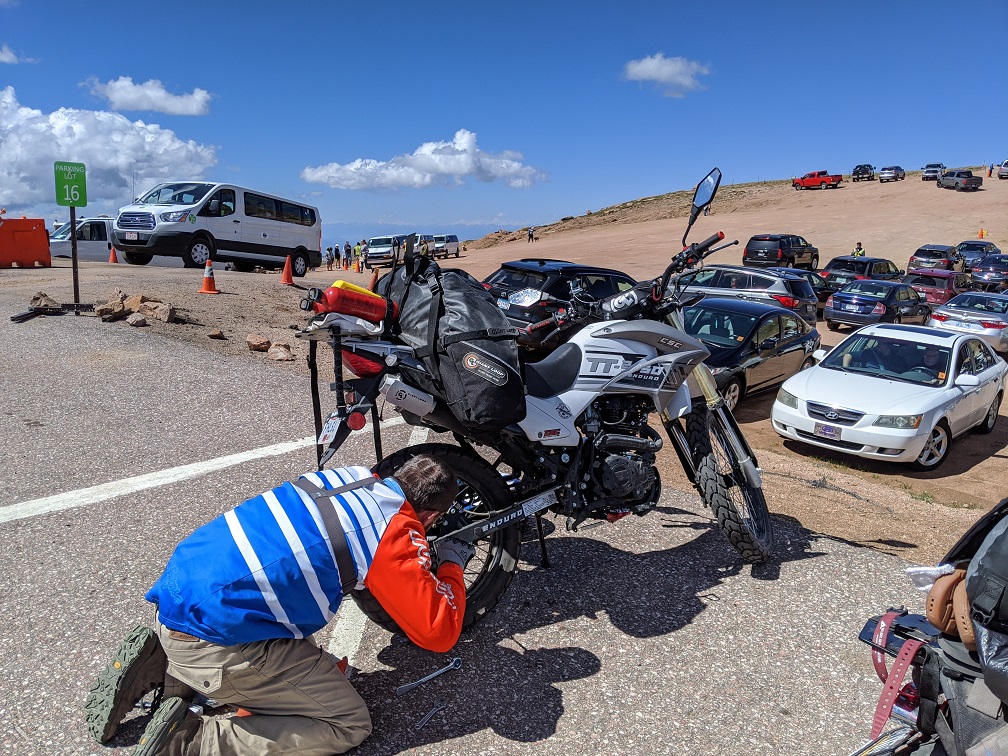
Chain tightening on Pikes Peak
“We met a couple that was down from Alaska on their V-Stroms and they asked about the CSC bikes. The conversation always goes:
“So what are they?”
“They’re CSC’s.”
“But who makes them? Is that a Yamaha? Honda …?”
“It’s a CSC.”
“And then they get pretty interested that we’re crossing the country on such small, Chinese bikes. Everyone gets excited about it. One guy, Duffy, likened the SG to an old Ducati he used to have. That’s pretty cool.”
“These 2 bikes are so easy to work on that it takes longer to get the tools out and then repacked than it does to actually adjust the chain. It takes about 5 minutes.”
“From Manitou Springs, we wandered over to the North Platte River Road, at the suggestion of @Velolion, and made our way over to Sedalia. If there are two roads in Colorado you need to ride, this is the second one.”
“After Sedalia, the mountains just melt away and before you know it, you’re in the plains. And it’s hot and the roads are straight, and the scenery quickly changes to small farming towns and cows. And then 200 miles later, you find Nebraska, home of the good life. Goodbye, mountains. Hello, plains.”
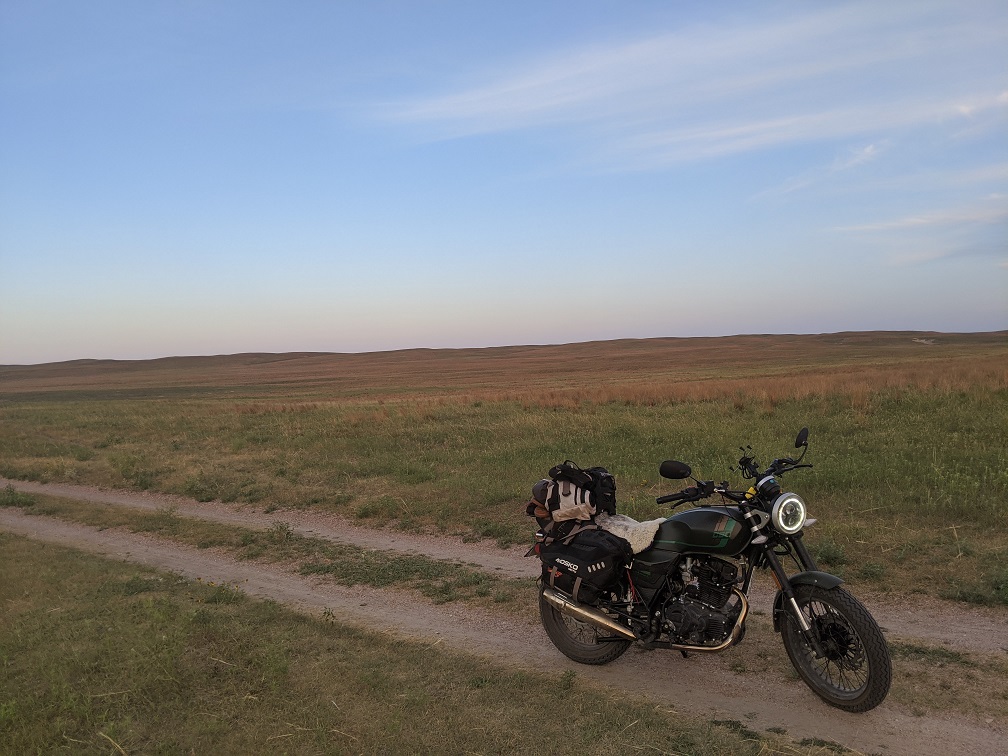
Goodbye mountains, Hello Nebraska!
“Now comparing the two cycles:
The TT250 and SG250 share the same motor but have different gearing. The TT is faster on long straights, but the SG will win from a dig. Also, we both think the SG’s carb is tuned a little differently than the TT’s because I couldn’t keep up at altitude at all, despite the better gearing for mountains. I have a larger front sprocket to put on for the rest of the trip, so I’ll let you know how highway speeds compare after that.”
“I fear my chain may be at the end of it’s life already, it feels very stretched. We’re keeping an eye on them, but I have had to adjust it more than I ever did with the GSA and I have only 20-percent as many on the SG. Ever since the scare before Moab, we have decided to change oil every 1000 miles, so that is also on the list for today.”
“James had ordered a new, smaller rear sprocket for the plains on the rest of the trip and didn’t want it installed. I guess he didn’t say that because CSC installed it during the pre-delivery and it has really helped him with higher speed runs. I just installed the new front sprocket (one tooth larger) on the SG today, so hopefully I have a comparable top speed now.”
“Changing the front sprocket on these bikes consists of 2 hex bolts for the cover and then 2 hex bolts to hold on the gear retainer. Just slip the old one off and put the new one on. Reverse the steps to put it all back together.”
“Dillon Brothers cycle shop in Omaha, NE was the next stop. We made it to within four miles of the shop and James lost his chain a second time. What was supposed to be a quick stop turned into a longer stop to replace a chain in the front entrance of this store. This was in heat that was worse than Death Valley! We got the chain done in record time and were so over the heat that we gave up on the camping and went right for a hotel. It had air-conditioning and it was perfect.”
“We left the hotel in the morning and headed for a parts store to get some oil as backup. These bikes run hot and don’t really care for high RPM’s for multiple hours. The new front sprocket on the SG has lowered RPM’s at cruising speed by about 2000, so it is much happier with the distances than it was, but it still complains at top speed.”
“After 3,000 miles, we neared the end of James’ portion of the ride. We have both been pleasantly surprised by these bikes. I got the SG because I was always planning to hold on to it for a little, while James was going to try to sell the TT when he got home. Now he is going to sell his other bike and keep the TT until he figures out what his next bike is going to be.”
“40 miles from James’s place, one of his pack straps came loose and wrapped around the rear axle and, before breaking, bent his luggage rack. That’s the most eventful problem we’ve had on the trip.
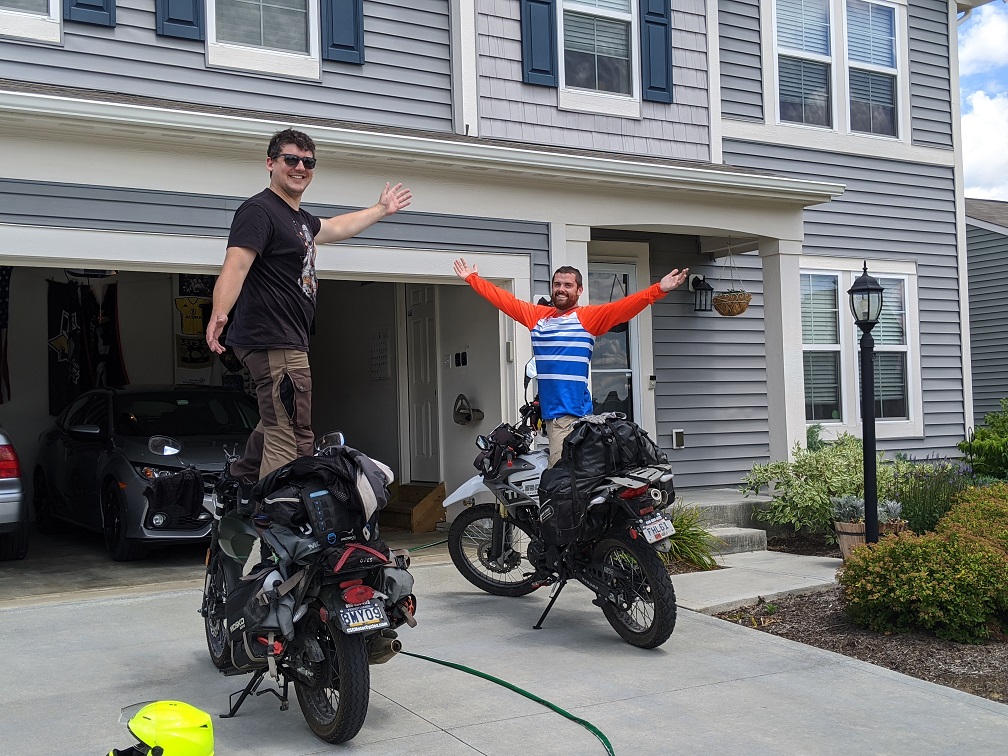
We made it to OHIO!
“Proof we’ve succeeded thus far. Only 214 more miles left for me!”
“Today was a good day. 3,786 miles down, covering 11 states, and two weeks with an old friend (James) and a very good, new friend (the SG250).”
“The brakes started off with the same feel as clamping a rotor with 2 pieces of wood and originally loved to lock. The tail light is an incandescent bulb and I now have to buy a fourth one because they shake themselves to death. The seat is really uncomfortable. The engine consumes oil at long, high revs. The exhaust will burn you any chance it can get.”
“But you know what? The brakes wore in, new bulbs are $3.00 for 2, a seat small cushion goes a long way, changing the front sprocket to the 17 tooth and keeping some oil on hand will eliminate any oil issues, and eventually you learn that you just shouldn’t touch the exhaust.”
“I didn’t expect this trip to go as flawlessly as it did, but the bikes soldiered on even when we didn’t expect them to. They did everything we asked of them and more. If you ever had a doubt about a CSC Motorcycle, let it go because they’ll surprise you with how good they really are.”
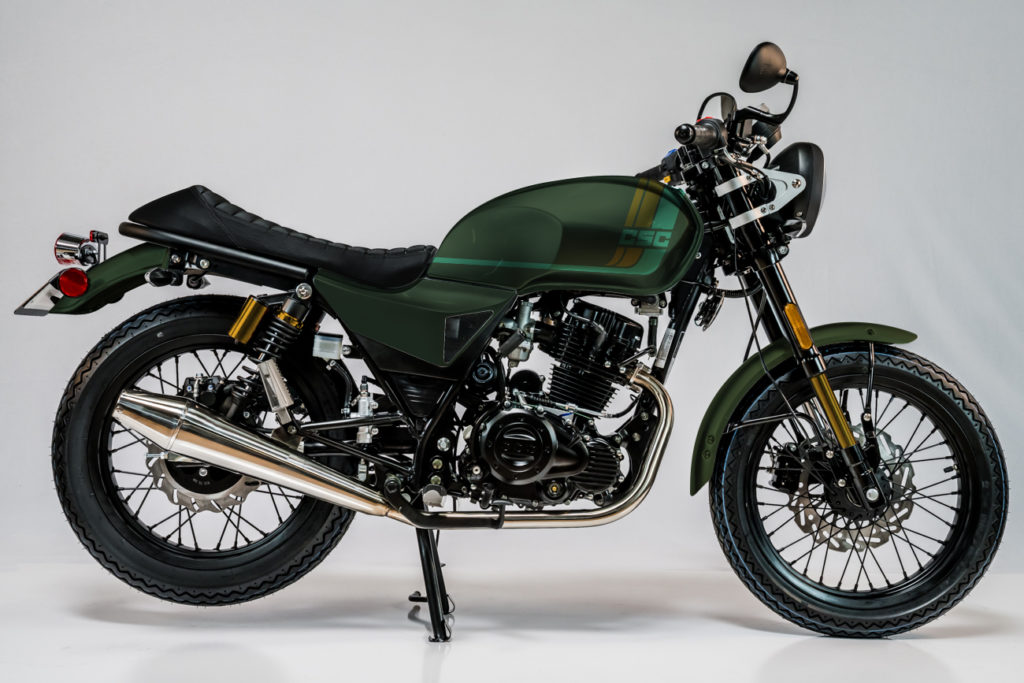
CSC Motorcycles SG250 “Cafe Racer”

CSC Motorcycles TT250 “Enduro”
______________________________________________________________________________
After a chance to reflect on the trip, Russ added these comments for the CSC blog:
Besides the initial electrical issue with the main plug wiggling loose, and the one instance of the bike randomly shutting off because it was getting too hot, there isn’t really much more to add from the ADVrider report. Both bikes performed beyond our wildest expectations.
It didn’t take long for reality to sink in: these bikes have small, air-cooled motors. We needed to ride them and adjust our expectations accordingly. Once we got into the routine of running for about two hours (or about 100 miles) – then stopping for a break – all of the anxiety seemed to just melt away. At this relaxed pace, these bikes can run forever. When our riding matched the capabilities of the SG250 and TT250, we both really started to enjoy the adventure.
My advice to anyone that wants to do a long trip like this would be:
1. Change the gearing on the bike before heading out. (Both bikes have LOW stock gearing. On the TT250, the easiest modification is a smaller rear sprocket. On the SG250, higher highway gearing requires a larger front sprocket.) Without higher gearing, the small engine will get really hot. It will keep running but will refuse to idle. Higher gearing means lower RPM’s on the highway. The bike runs better, and the ride is more enjoyable. Someone on the forum also suggested adding an oil cooler, and this might be a possibility to improve cooling and reduce fading at higher elevations.
2. Have CSC change the gearing AND install a new chain at the same time! I’m sure the stock chain is fine for most city commuters. But if you are planning to ride 300 miles per day for two weeks you want to avoid issues with the stock chain wearing out, stretching, and falling off! Believe me, you want to avoid having the chain fall off at 60 mph with a fully loaded bike. The aftermarket chain is better quality and your best investment.
3. Check your oil continuously. EVERY time the engine cools down to where you can touch it, check the oil. These engines are tough, but only have small oil reservoirs. We used the sight glass and just kept the oil towards the top with the bike level. It only takes two seconds but is well worth the time!
4. Even for a summer trip, bring more warm layers than you think you’ll need. Everyone is quick to tell you about how hot the West is during the day, but they never tell you how cold it gets at night or when you’re crossing the Rockies at high elevation! I took a 45-degree down blanket and no long underwear and absolutely froze the first few nights camping. I would recommend a 30-degree sleeping bag and long underwear at a minimum. Remember: the long underwear you have at home will be cheaper than anything you’ll find on the road, especially shopping in the middle of the summer.
5. Take more layers, but pack less of everything else! If you think you’d like to take something that you MIGHT use a few times, you don’t need it. I packed a pan for cooking breakfast and didn’t use it a single time. All I needed was one small pot to boil water or heat a can of soup. This was a road trip. Unless you really head into the back country for several days, you are never far from a town with food and fuel. You will also be too tired to do more than boil some water.
6. A small backpack with a water bladder (Camelback) is better than a water bottle in your luggage. You can drink water without having to stop so you will drink more and more often. You don’t take up room in your luggage with water bottles. My 3-liter water bladder proved to be more than enough on most occasions. For the few times when it was really hot and I needed more water, I added a few liters from the next gas station. Those empty bottles made great funnels for adding oil to the engine.
7. The people you meet on the road will give you better stories and local info than any overlook ever could. Don’t be afraid to talk to that random old guy at the gas pump that probably shouldn’t be driving anymore. I bet you his stories will be the highlight of your day.
______________________________________________________________________________
THANKS for the Epic Ride Report, Russ and James! Like many other riders have discovered, riding a small bike has its challenges but also a new set of advantages! Not only can you enjoy the experience at a fraction of the cost, but you are FORCED to slow down, take in the scenery, and disconnect from the fast pace that defines the remainder of our lives!
To learn more about the full range of models from CSC Motorcycles – please visit CSCMotorcycles.com.
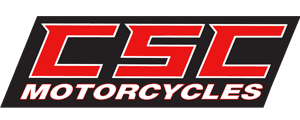
LEARN MORE AT CSCMOTORCYCLES.COM
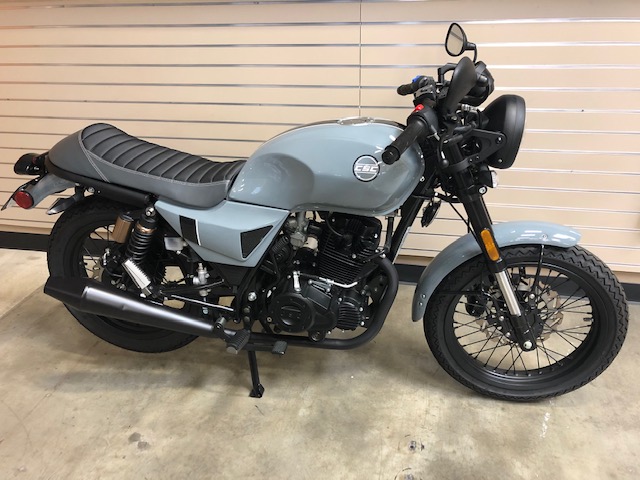

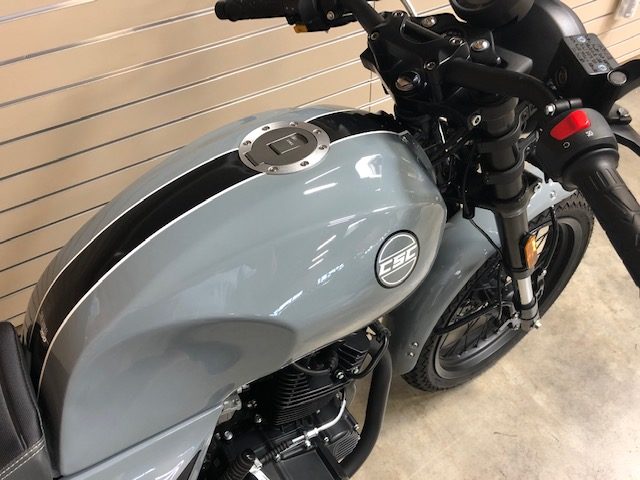
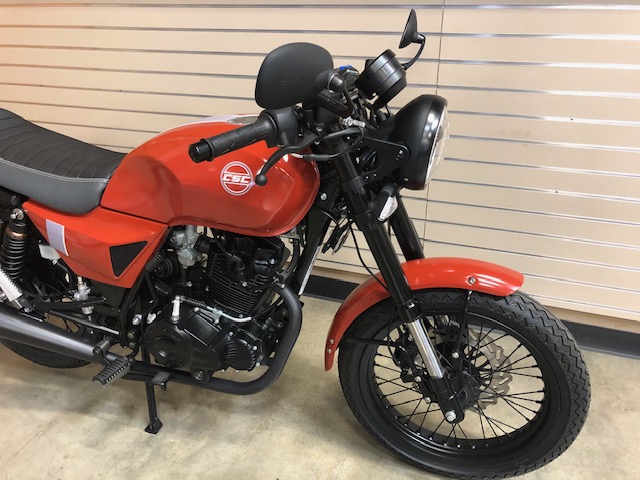
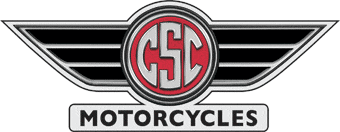





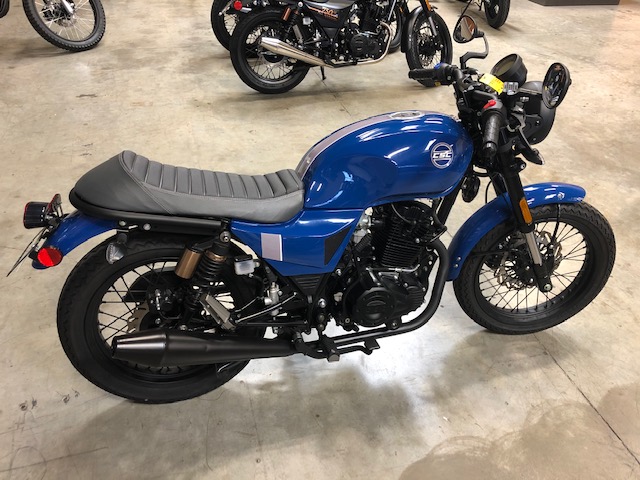
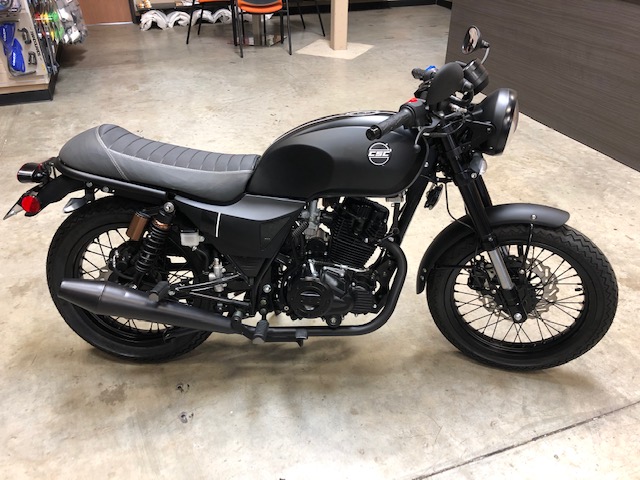
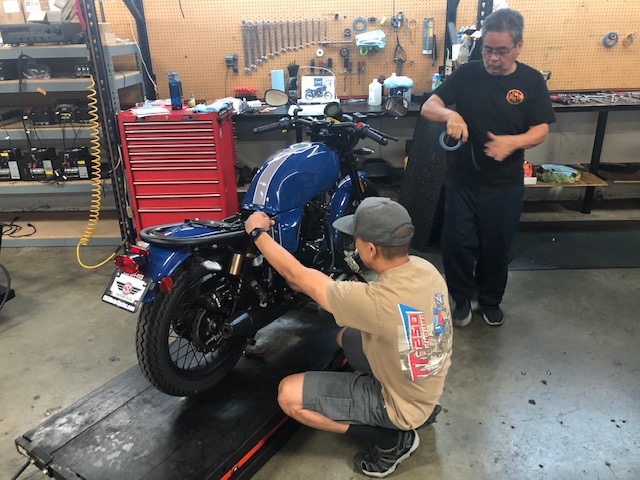
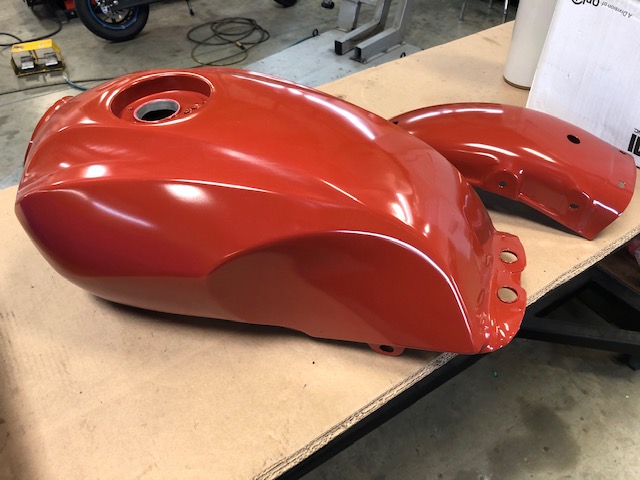
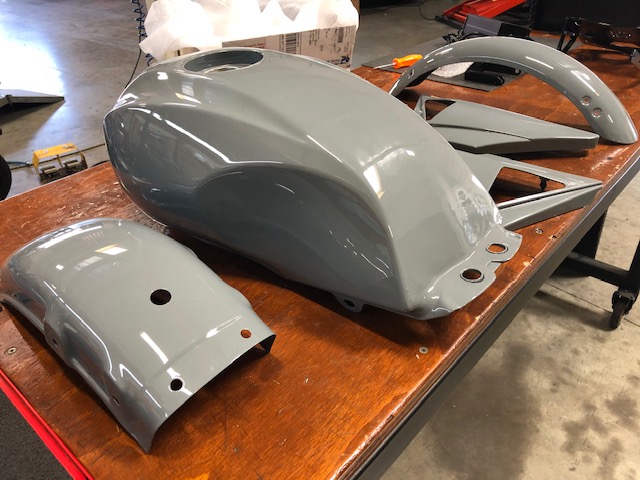






















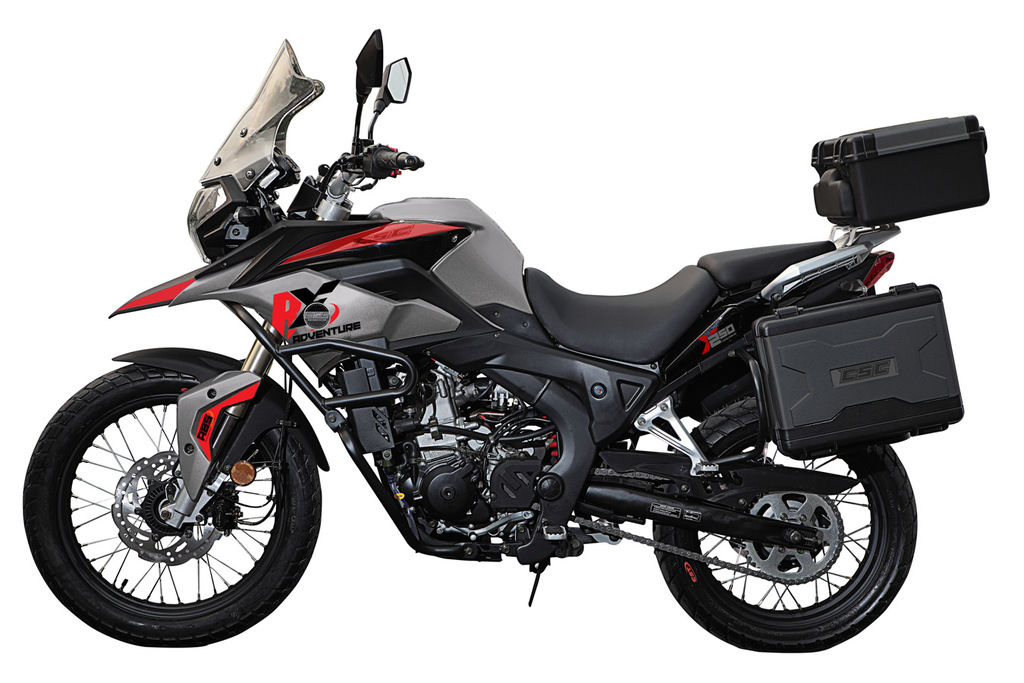
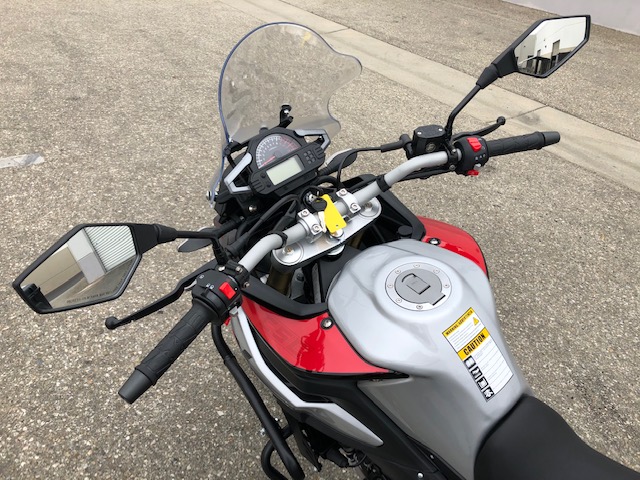
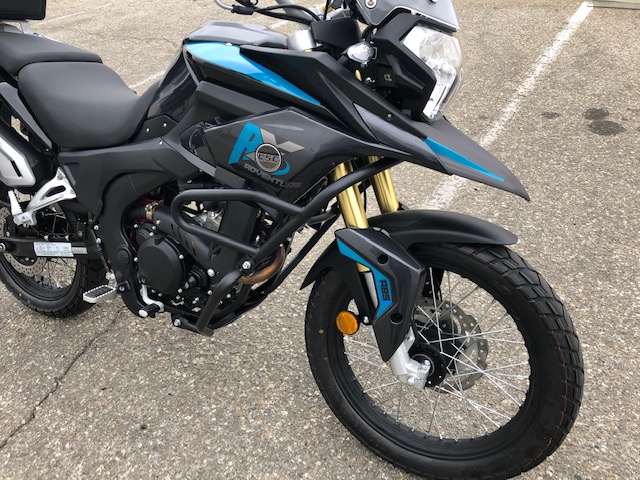
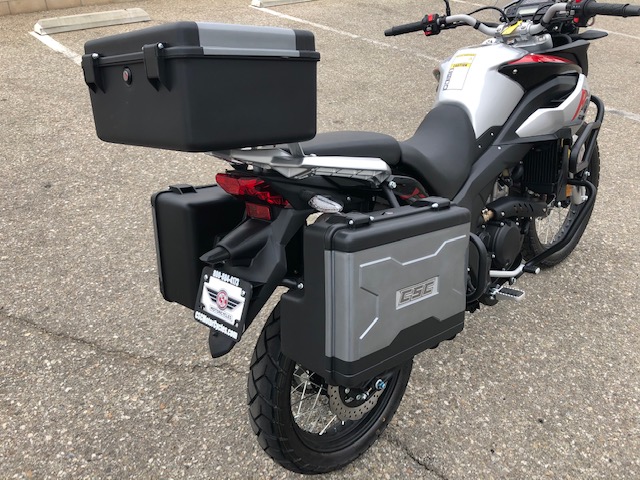
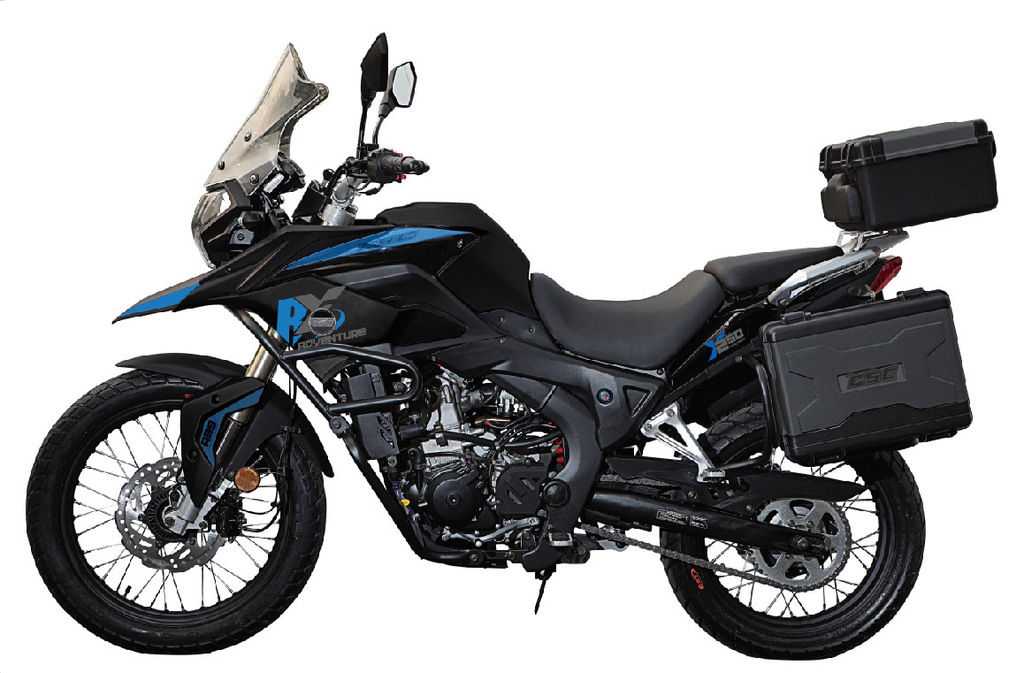


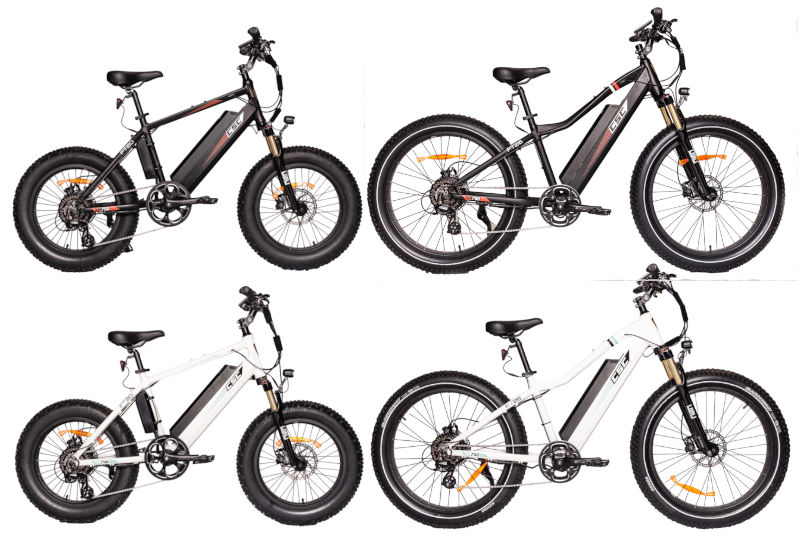
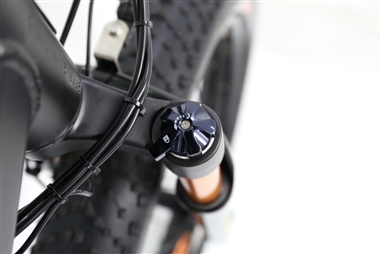
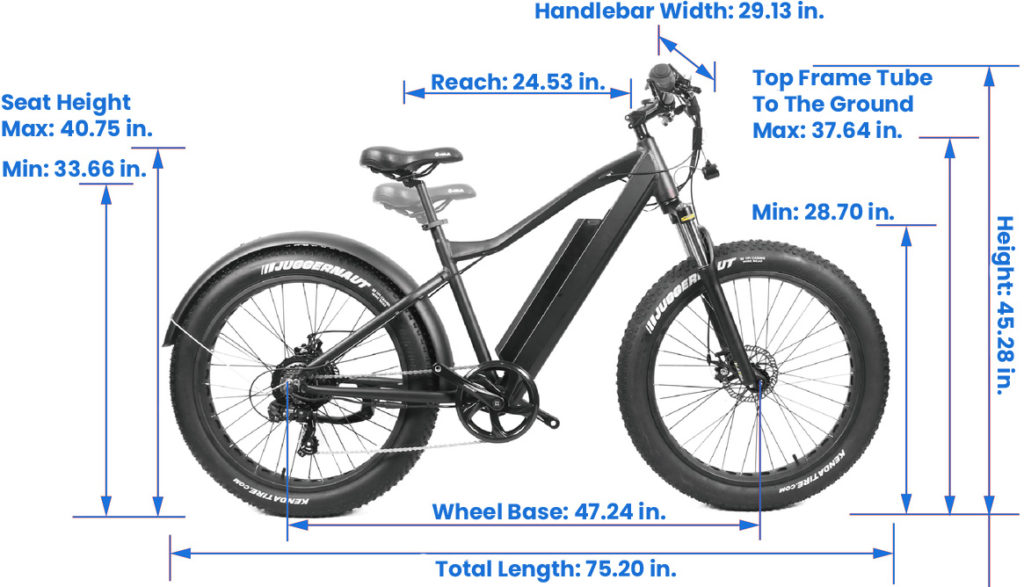
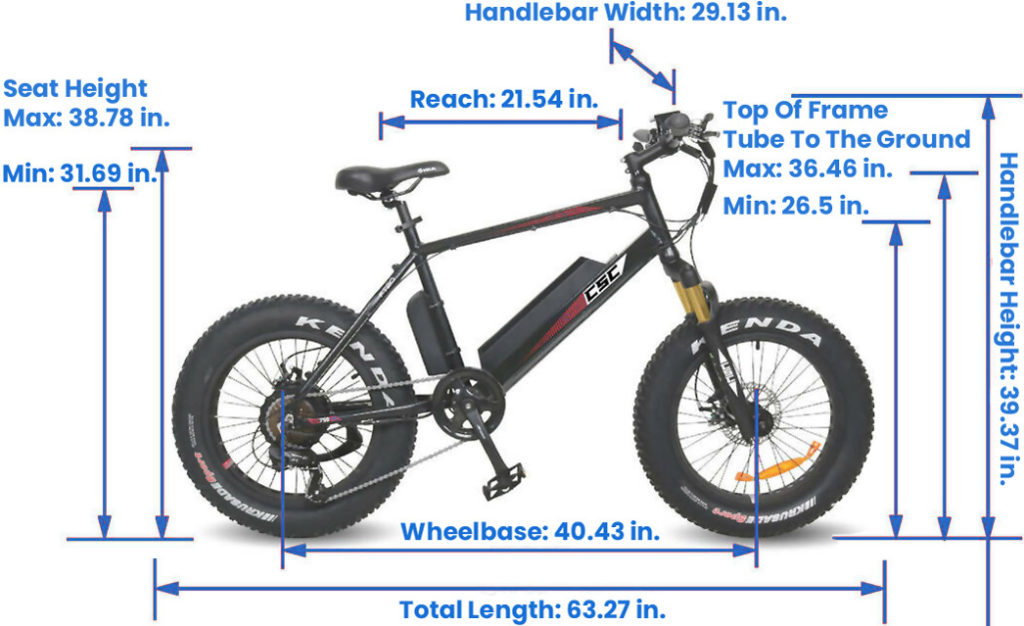
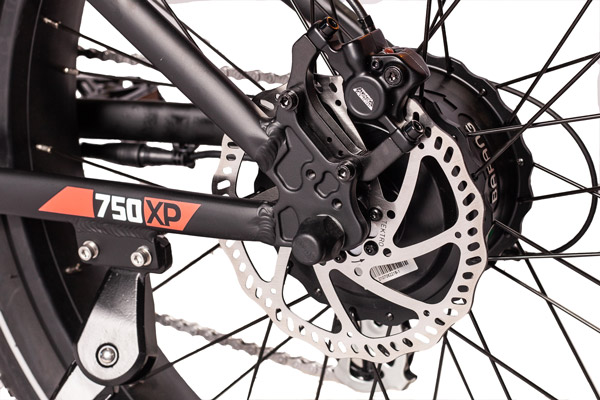
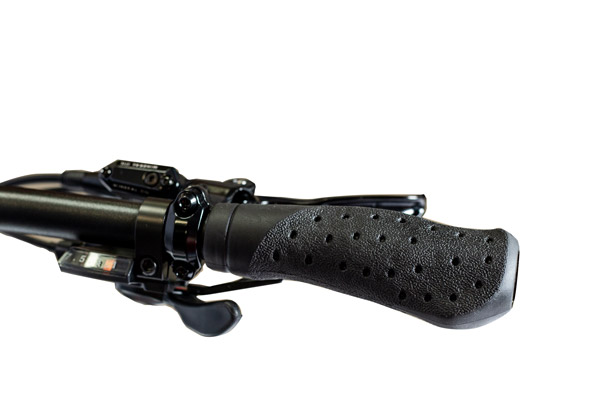
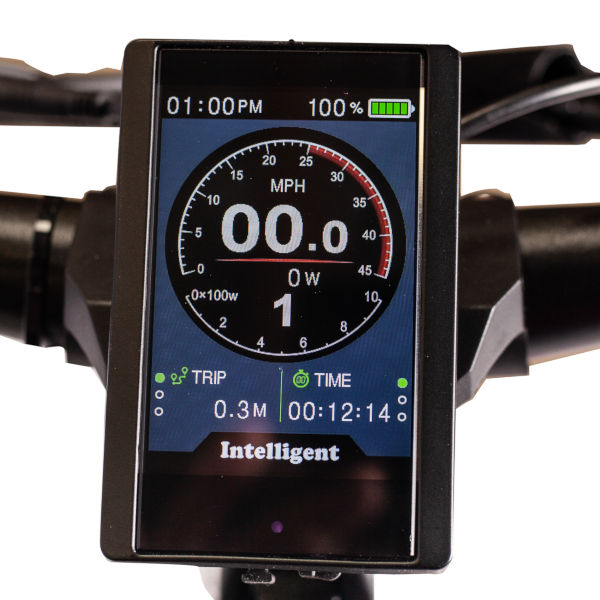
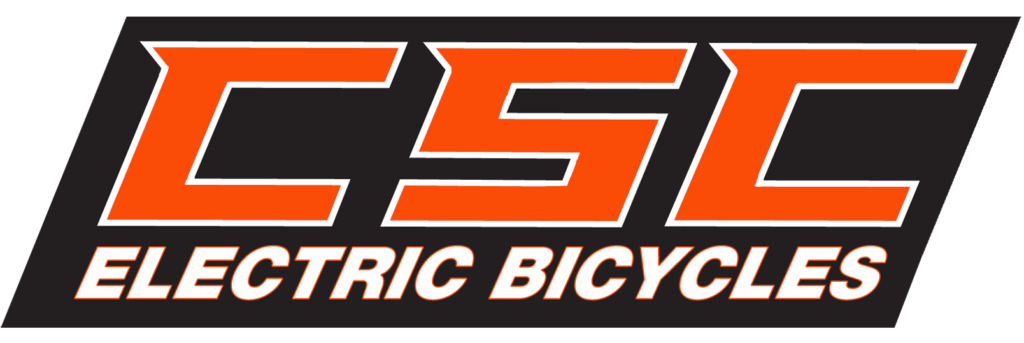
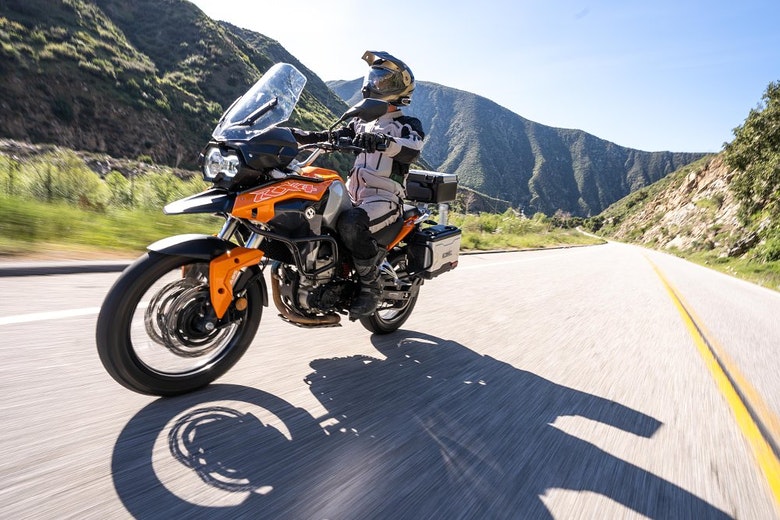
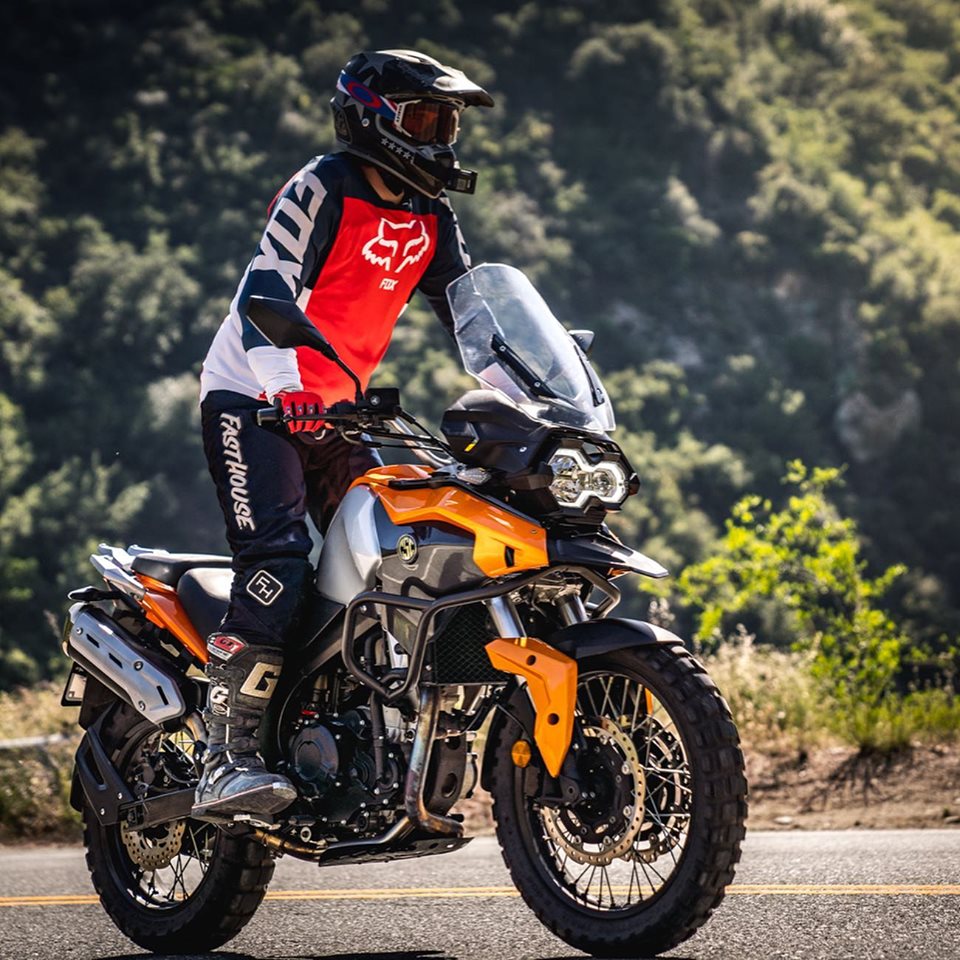
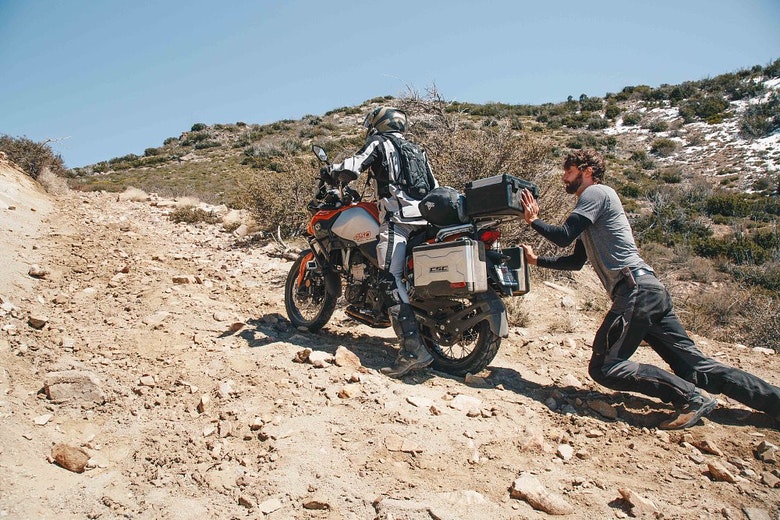
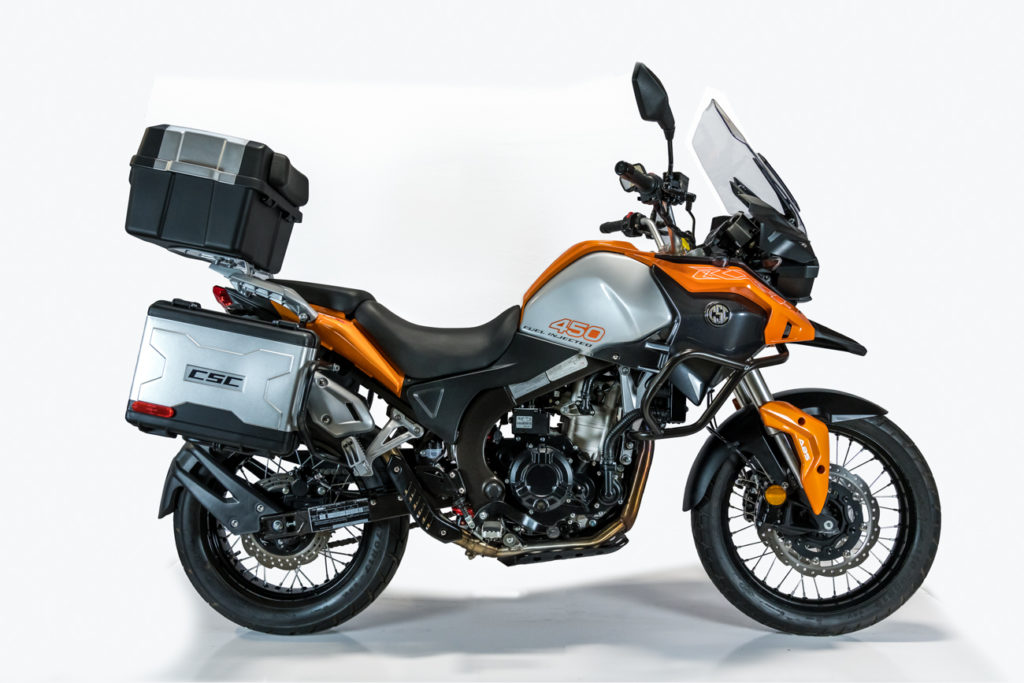
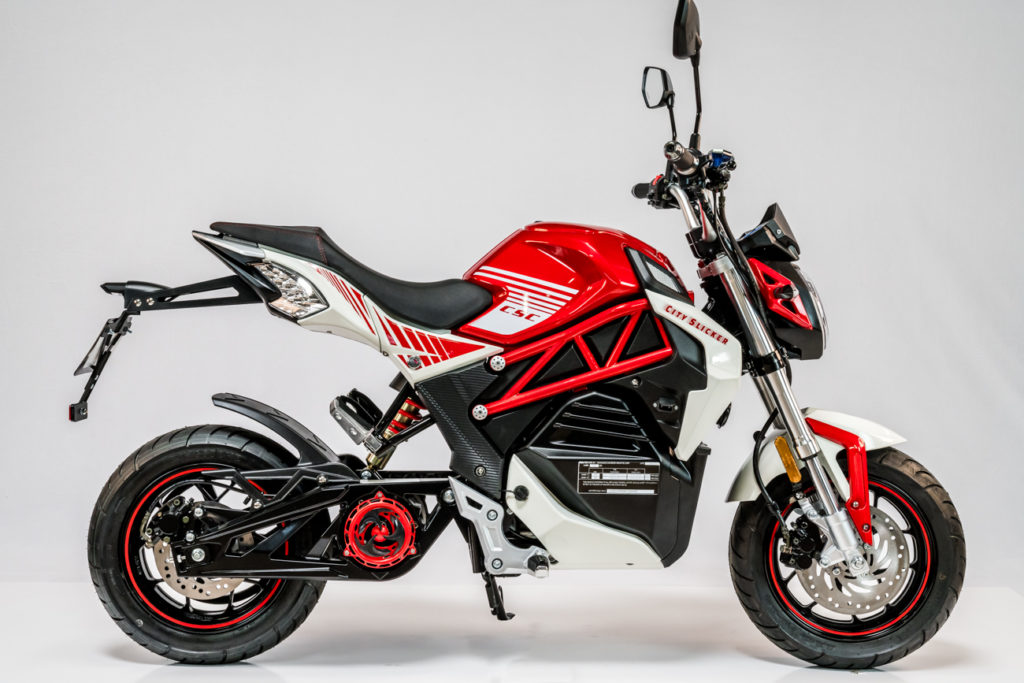
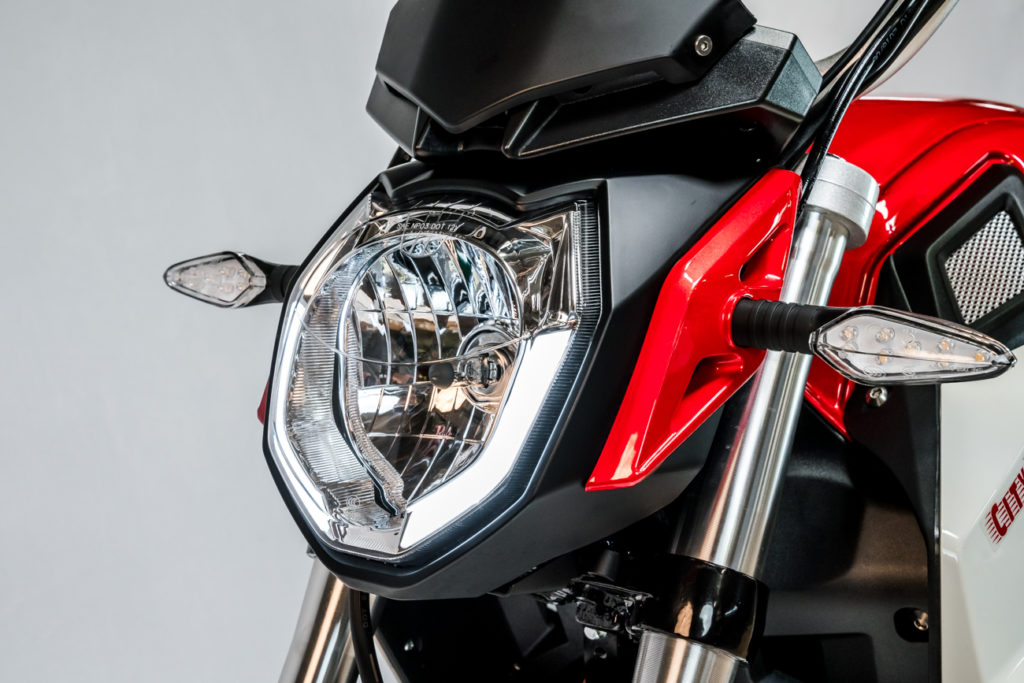
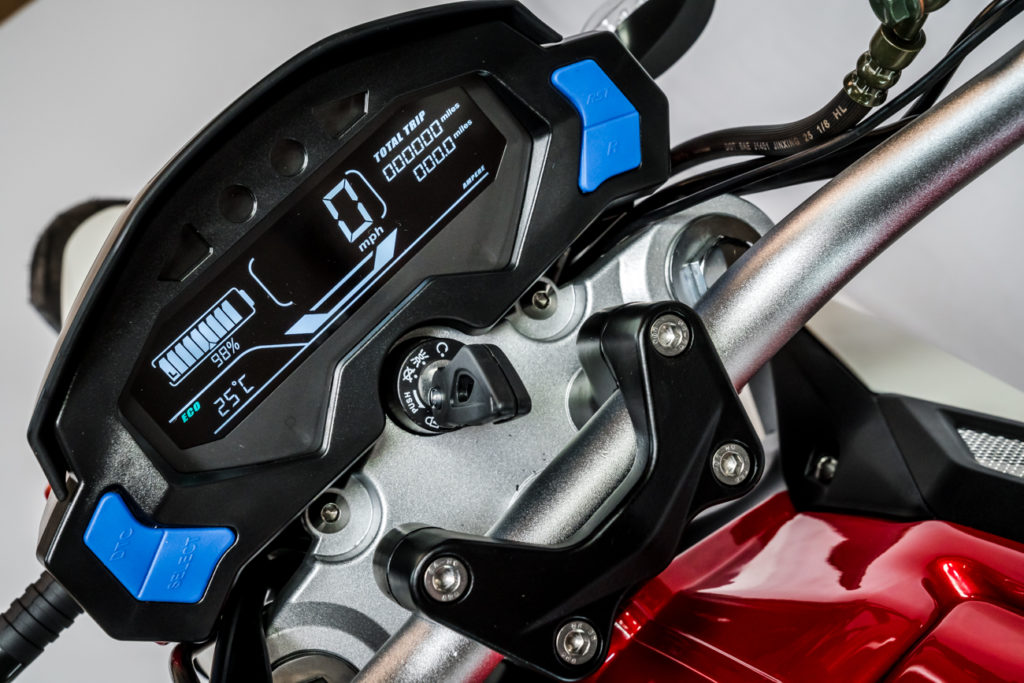
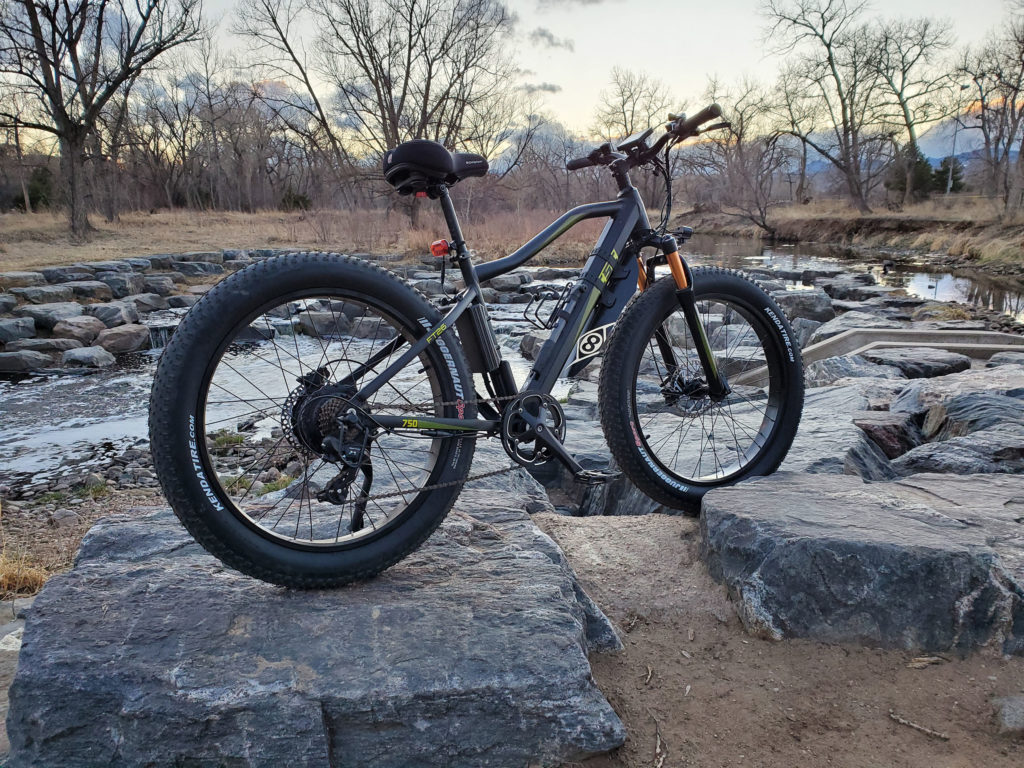
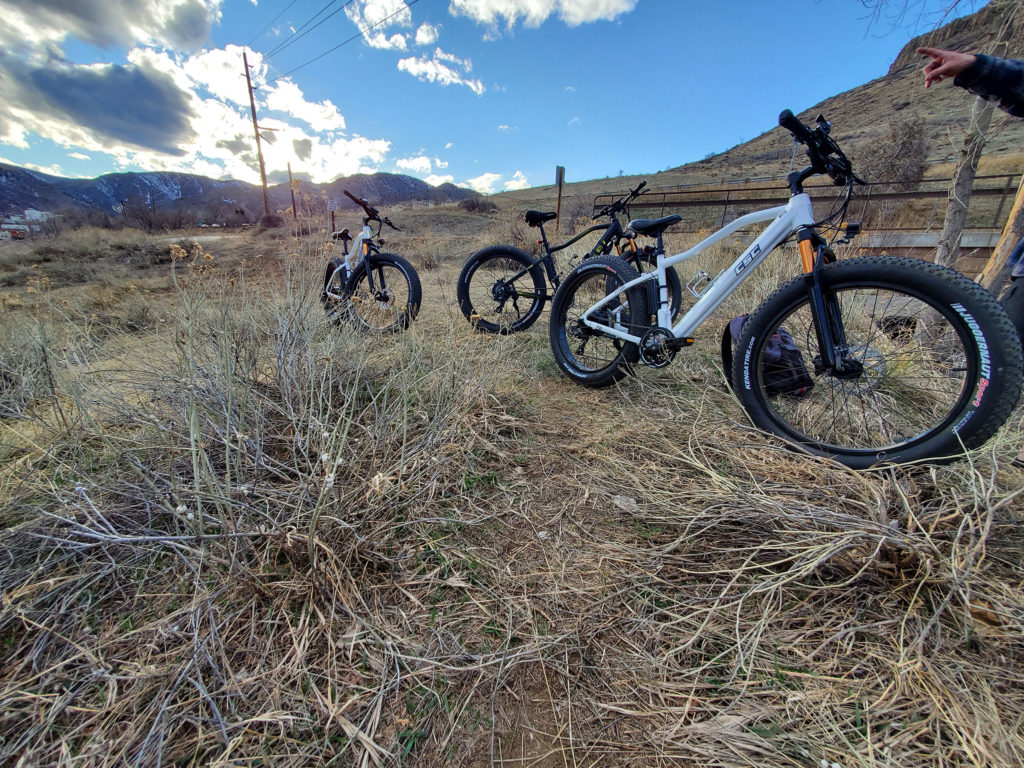
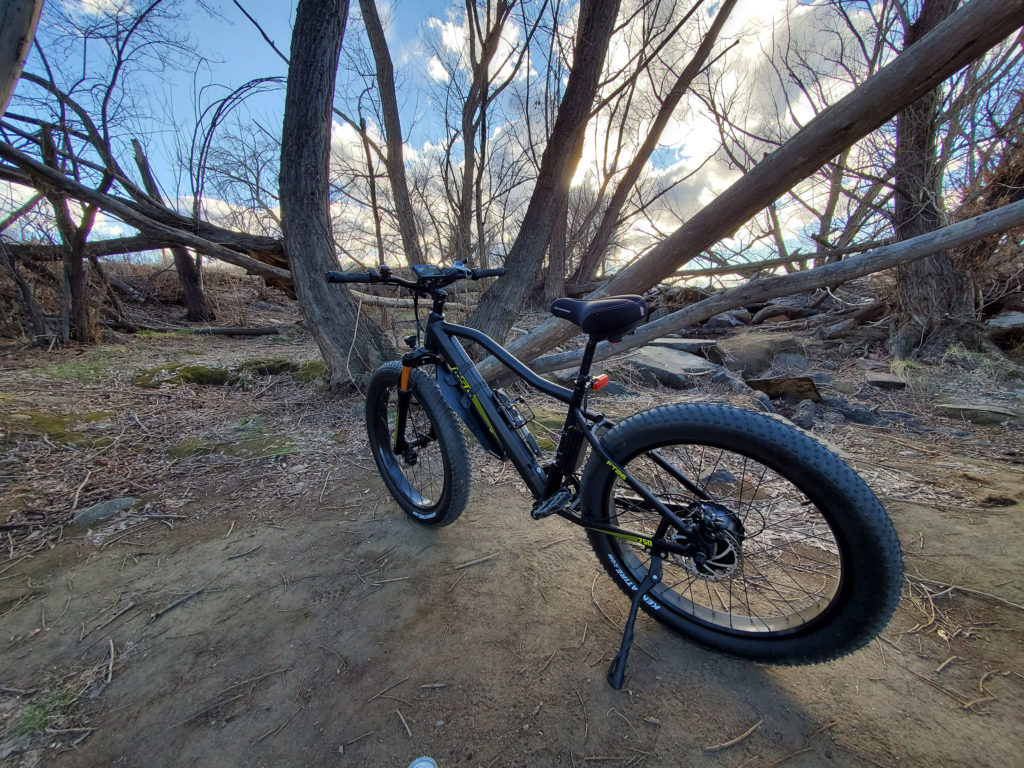
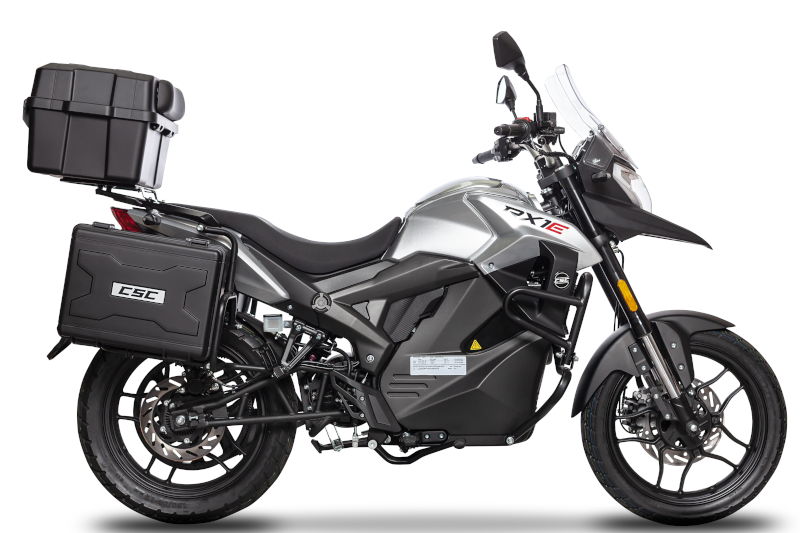 RX1E Electric Motorcycle
RX1E Electric Motorcycle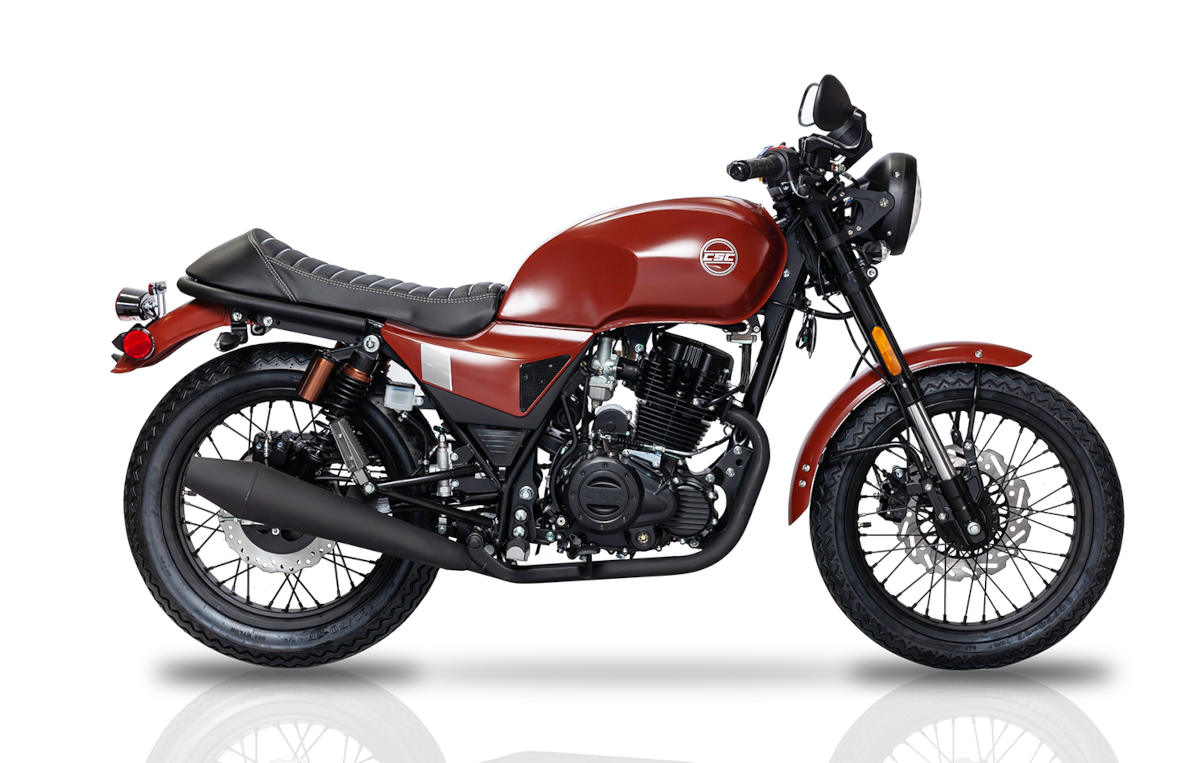 SG250 San Gabriel Cafe Racer
SG250 San Gabriel Cafe Racer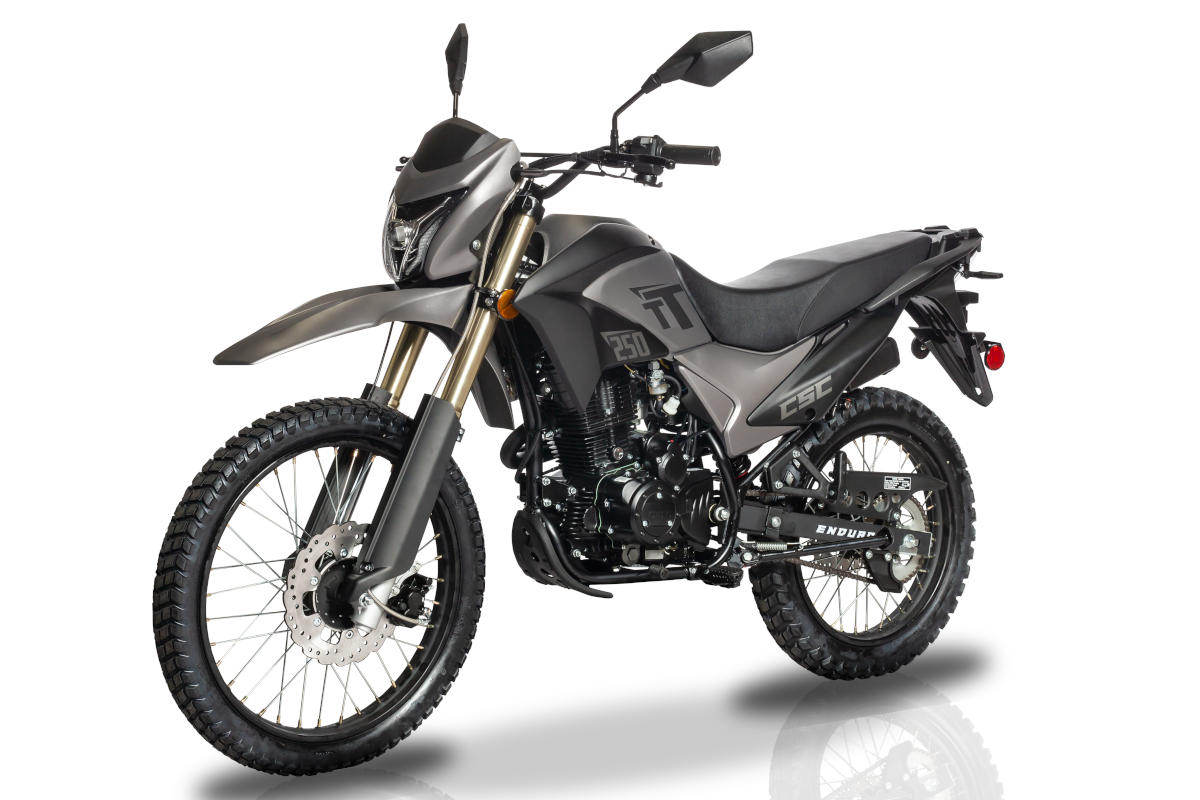 TT250 Enduro
TT250 Enduro